11 self-made millionaires reveal the best advice they ever got
If you’re looking for the top advice on life and business, look no further.
These millionaires and "Advisors" in The Oracles have had some super-smart mentors; so we asked them for the best advice they’ve ever received. Here’s what they told us — and how it led to their success
1. “You’ll never succeed without me.”
The best (and worst) advice I ever received came in the form of an insult from my long-term boyfriend and business partner. He dumped me for my secretary, and said this to me as he was leaving. I knew I would rather die than let him see me fail! His sage advice made me more determined to become a big success, and I worked harder than ever to prove him wrong.
An insult is advice in reverse — and almost always proves to be the best advice you’ll ever hear. —Barbara Corcoran, founder of The Corcoran Group, podcast host of “Business Unusual,” and Shark on “Shark Tank.”

Shark Tank judge Barbara Corcoran. (Photo: The Oracles)
Spend better, save better: Sign up for The Daily Money and get all the advice direct to your inbox
2. “Become an expert at something.”
Ever since my college professor gave me this advice, I’ve applied it to almost everything I do. Personally, I focus on being an expert at leadership, entrepreneurship, product innovation, and parenting. Professionally, I created Bluemercury to be the experts at beauty advice.
To make that happen, we needed the most knowledgeable staff in the industry. When we started the business in 1999, most industry employees were only given part-time work — and none during the low season.
So we asked ourselves: What if we gave our staff full-time work, benefits, leadership and management training, and a career path? Industry veterans said this would never work, but we did it anyway.
Want to get promoted? Wow your boss with these five easy tips
“Kindness always wins:” 10 successful people on how to get anyone to open up to you

Marla Beck, co-founder and CEO of Bluemercury. (Photo: The Oracles)
As a result, we retained our employees’ expertise, customer relationships, and loyalty. Our people are still the key to our success today. —Marla Beck, co-founder and CEO of Bluemercury, which was acquired by Macy’s for $210 million; creator of M-61 Skincare and Lune+Aster cosmetics.
3. “Would you rather be a 30-year-old Navy SEAL or a 30-year-old CPA?”
When I was 24, I was a CPA and MBA student who wanted to become a Navy SEAL. But I wondered: Could I throw it all away for a dangerous career?
The Navy required a six-year commitment even if I wasn’t accepted into the SEALs — which is notoriously difficult. When I shared those concerns with my mentor, Jeff Schafer, he asked how old I would be at the end of the commitment. Then he asked: “Would you rather be a 30-year-old Navy SEAL or a 30-year-old CPA? Because either way, you’ll still be 30 in six years.” With that perspective, I went for it and had a long career as a SEAL.
No matter how long it takes to reach your goal — or how scary and difficult it seems — that time will pass anyway.
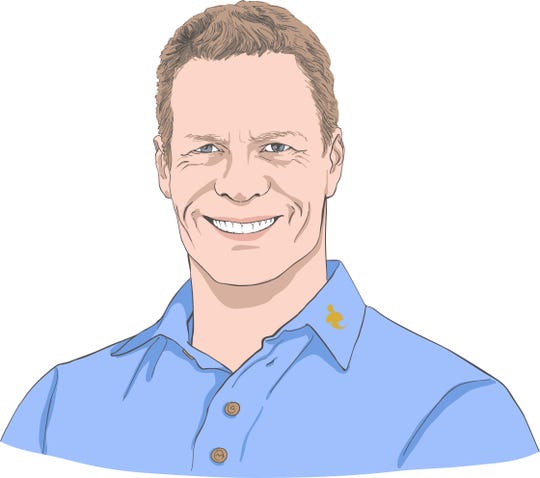
Mark Divine, retired U.S. Navy SEAL commander. (Photo: The Oracles)
Would you rather have regrets or know you gave it your best shot? —Mark Divine, retired U.S. Navy SEAL commander, New York Times/Wall Street Journal bestselling author, and founder of Unbeatable Mind and SEALFIT; follow Unbeatable Mind on Facebook, Instagram, or YouTube
4. “All events in your life are neutral until you label them.” During my recovery from a near-death cycling accident, I struggled with many “life isn’t fair” moments. Instead of feeling grateful to be alive, I was bitter and angry.
At 33 years old, I thought I was at the prime of my life and worried who I would become after I recovered. When I unloaded my frustrations on a mentor, he told me, “All events in your life are neutral until you label them. Nothing has meaning until you give it meaning.”
This shifted my perspective and showed me the possibilities. Even though things looked dark and difficult, I had a choice. I could be a victim or use the opportunity to create a better version of myself and inspire others.
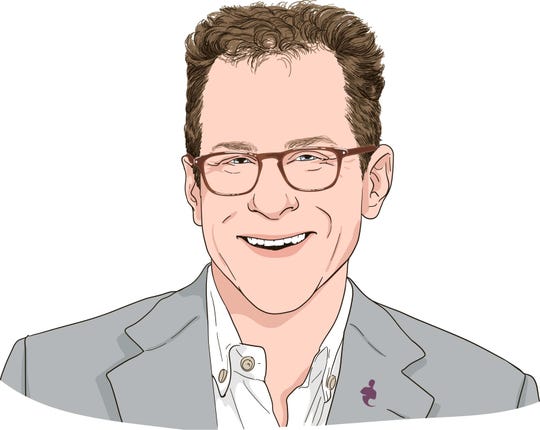
Michael O’Brien, executive business coach. (Photo: The Oracles)
That advice helped me reach the corporate executive suite and now helps me inspire other corporate leaders to shift their perspectives and see the possibilities. —Michael O’Brien, executive business coach, author of “Shift: Creating Better Tomorrows,” and founder of Peloton Coaching and Consulting and The Pace Line Leadership Academy; read Michael’s story and connect with him on Facebook and LinkedIn.
5. “You’re only as good as the people you surround yourself with.”
I was in my late 20s and had started a new role as a supervising producer at Getty Images when my friend and mentor, Dave Adelson, gave me this advice.
Up to that point, I often had difficulty sharing the workload and tackled most tasks by myself. It wasn’t that I enjoyed taking on so much, but I didn’t always trust others to perform tasks as well as I would. Dave taught me that while you may be able to accomplish success by yourself for a while, it’s essential to delegate to reliable team members if you’re in it for the long term.
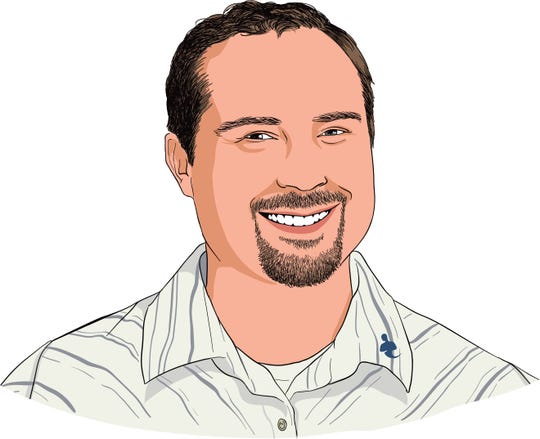
Johnathan Ruggiero, co-founder and CEO of wedding band company Manly Bands. (Photo: The Oracles)
To truly achieve personal and professional growth, you must share the responsibility with others you can trust, which is what we’ve done at Manly Bands. —Johnathan Ruggiero, co-founder and CEO of wedding band company Manly Bands; read Johnathan’s story and connect with him on LinkedIn
6. “Do the best job you can at everything you do. The result is not your responsibility.”
The man who said these words founded the entrepreneurship school at my college, which is where I first heard this advice. But it took me a while to truly understand and appreciate it. First, I had to experience many successes — and, more importantly, failures.
All you can do is your best. It doesn’t matter if something in the world changes. Someone may take your job, a competitor may come out with a better product, or someone may wrong you. Beating yourself up because things didn’t turn out like you wanted won’t help.
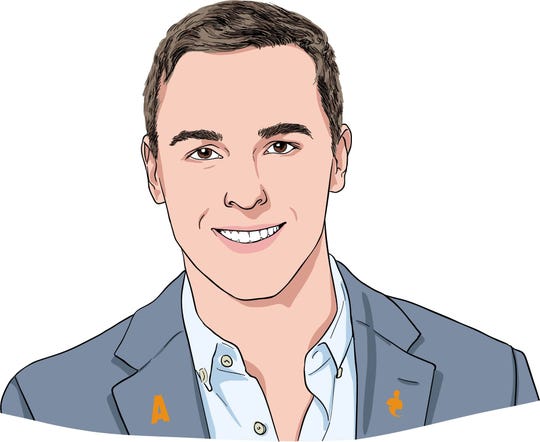
Matt Clark, co-founder and chairman of Amazing.com (Photo: The Oracles)
Learn from the experience, focus on what you can control, do your best in everything you do, and don’t worry about the results. Eventually, you’ll create a great life. —Matt Clark, co-founder and chairman of Amazing.com and co-creator of Amazing Selling Machine; connect with Matt on Instagram.
7. Be patient and persistent.
My uncle taught me the importance of persistence and patience. My day trading career required both of these qualities. Everyone thinks they’re going to become a millionaire after a weekend course, but trading is a skill you have to develop. It took me several years to achieve consistency.
Similarly, it took time for my travel blog, WanderingTrader, to gain traction. When Google’s algorithm
changed and its popularity took a nosedive, I asked my uncle if I should quit. He told me to stick with it, so I did. At its peak, it was one of the most popular travel blogs in the world. Too often we look for immediate results, but anything of value takes time.
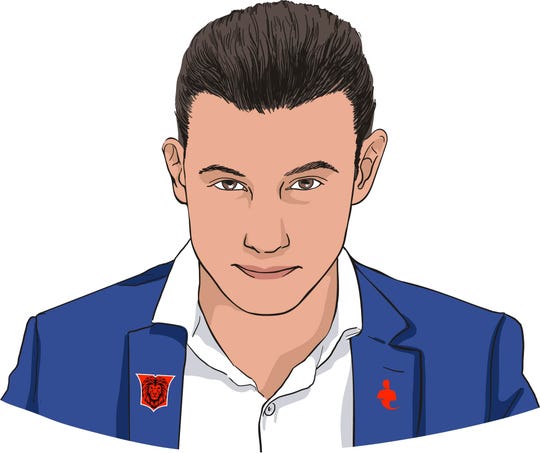
Marcello Arrambide, founder of Day Trading Academy (Photo: The Oracles)
As they say, “If at first you don’t succeed, try, try again.” —Marcello Arrambide, founder of Day Trading Academy and co-founder of SpeedUpTrader, a funding company for aspiring day traders; connect with Marcello on Instagram and LinkedIn
8. “The best products and businesses exist to reduce friction.”
Serial entrepreneur Dave Perry gave me this simple advice, and it changed the way I look at business and technology. Modern life is increasingly complex, driven by much of the technology we engage with daily. Dave’s words remind me to look for ways to counteract that. Deliberately seek out what’s causing friction for your customers and improve it. It doesn’t have to be revolutionary.
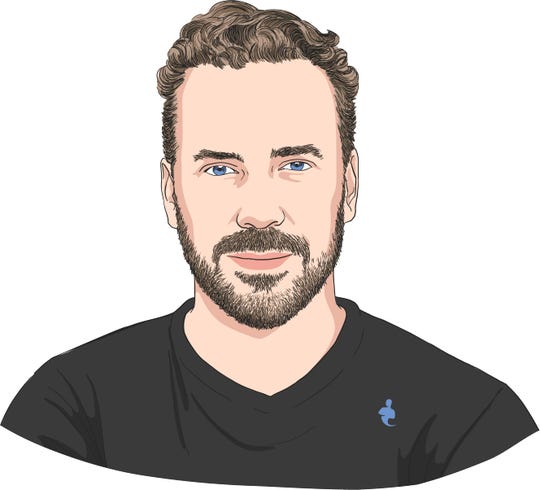
Luke Freiler, CEO and co-founder of Centercode. (Photo: The Oracles)
Make their lives easier, and they’ll love you for it. —Luke Freiler, CEO and co-founder of Centercode, a Customer Validation solutions provider that helps hundreds of enterprises and high-growth tech companies bring dynamic and delightful products to market; connect with Luke on LinkedIn.
9. “There is abundance for everyone. You just need to dive in and grab it.”
Several years ago, I felt lost about how to reach my goals. My boss at the time inspired me; while she was busy and successful, she was also carefree and had everything under control.
We were discussing climbing the corporate ladder as a woman, and she said something like, “There is abundance out there for everyone. They just need to dive in and grab it!” That made me realize that I could find abundance too.

Michelle Luchese (Photo: The Oracles)
Today, as our company is becoming successful, I know that I don’t have to feel guilty about it — because there is opportunity for everyone. —Michelle Luchese, co-founder and chief product officer of wedding band company Manly Bands; read Michelle’s story and connect with her on LinkedIn.
10. If you have time and energy for the work you’re meant to do, there’s no such thing as ‘too much.’
When I was 29 years old, business was going really well. I was making more money than I ever dreamed, but my relationships and quality of life suffered, and I had stopped all my hobbies.
I knew something had to change; so I sought answers at an event called Mastermind Talks, where I befriended Dandapani, an entrepreneur, Hindu priest, and former monk. I asked him: “Things are going pretty well, but how do I know how much is too much?” He told me there is no single answer, and as long as I had time and energy to do the work I’m meant to do, there is no such thing as “too much” money or a company that’s “too big.”
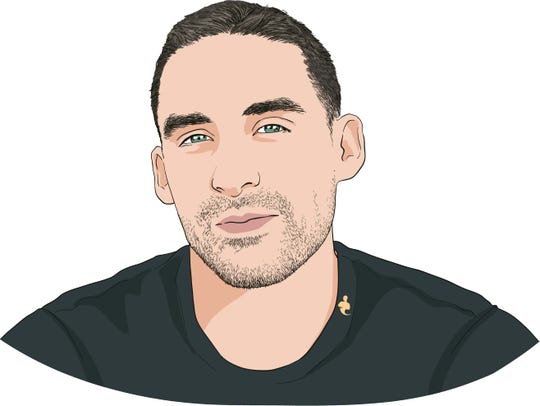
Jonathan Goodman, founder of the Personal Trainer Development Center. (Photo: The Oracles)
But the minute this takes away from what energizes me, it’s too much. After that conversation, I taught myself when to say yes and how to say no confidently. —Jonathan Goodman, founder of the Personal Trainer Development Center and the first-ever certification for online fitness training, the Online Trainer Academy; connect with Jonathan on Facebook and Instagram.
11. “Stay the course.”
My mentor, the bestselling author Dr. George C. Fraser, said these words to me when I had just decided to become an entrepreneur. Three words in three seconds and my understanding instantly expanded. Over the past 12 years, I’ve helped 7,500 students create $260 million in revenue, and this is the one consistent piece of wisdom that I pass down to them.
When you’re new to entrepreneurship, three things can quickly and easily knock you off your path: Doing business alone, without mentorship and coaching. Doing business alone, without mastermind partners and collaborations. And finally, doing business with shiny-object syndrome, where you let every new idea that blows through your market throw you off your goals. Stay the course. Stay on course.
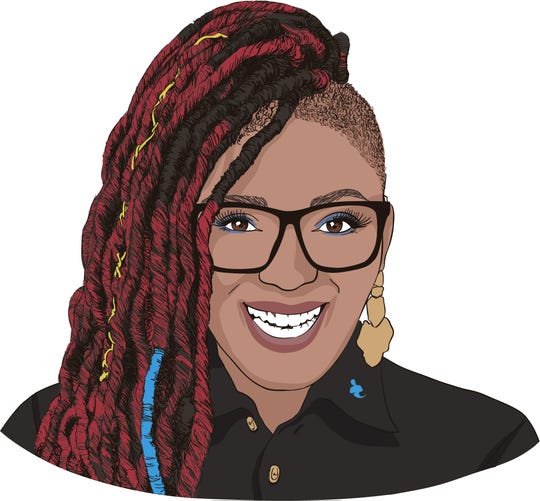
Allyson Byrd, top sales trainer, who generated $13 million-plus in sales revenue for clients in 2018. (Photo: The Oracles)
Embrace an unwavering commitment to your North Star and your definition of purpose and success. —Allyson Byrd, top sales trainer, who generated $13 million-plus in sales revenue for clients in 2018; Amazon bestselling author of “Leave Your Mark” and founder of The Church of Profit Acceleration; connect with Allyson on Instagram and Facebook.
Want to share your insights in a future article? Join The Oracles, a mastermind group of the world’s leading entrepreneurs who share their success strategies to help others grow their businesses and build better lives. Apply here.
For more free business insider advice, follow The Oracles on Facebook,Twitter, and LinkedIn.
Read or Share this story: https://www.usatoday.com/story/money/2020/01/21/11-self-made-millionaires-reveal-best-advice-they-ever-got/4489027002/
When Your Best Surrogate Can’t Talk
Fans follow the ups and downs of the dogs’ lives, learning of their hopes and passions, including those that have to do with peanut butter. In October, the subject was Buddy’s Halloween costume, a shiny green-and-yellow outfit, the meaning of which was unclear at first.
“OMG GOT MY HALOSWEEN COSTUM,” the dog (or someone in the voice of the dog) wrote. “DO YOU WANT TO SEEZ IT OMG I AM so EXCITE.”
But what was it, exactly? The caption on the photo said it. “ACVOCADO”
The Buttigieg dogs have taken a bold approach to the classic Twitter conundrum: Do you say some normal thing while abiding by conventional rules of spelling, grammar and punctuation, or are we pioneering a whole new freestyling vernacular in which there seems to be no filter between our random fleeting thoughts and our thrilled belief that other people want to hear them?
Don’t ask the Buttigieg campaign. “Buddy and Truman have full creative control over their Twitter account,” Tess Whittlesey, deputy national press secretary, said via email.
As for the dogs’ part in the campaign: “The dogs primarily serve in the important role of South Bend representatives for the campaign while Pete and Chasten are on the road,” she said. “They have quite the following in South Bend as well, and always enjoy running into friends and neighbors when they are walking around the city. They haven’t hit the campaign trail quite yet, but hope to soon.”
Interestingly enough, Bailey does not have his own social media account. An independent fan account (@FirstDogBailey) is operated by 28-year-old Robert Abare, who works for a think tank in Washington.
In contrast to the Buttigieg dogs’ Twitter account, which is managed by humans “as if they’re actually dogs who can’t speak English and don’t understand what Twitter is,” Mr. Abare said, “I took an approach that Warren is an intellectual who is running this aggressive campaign focused on issues like corruption.”
Experience marketing is the new kid on the block
In July 2018, a giant statue of American actor Jeff Goldblum appeared in London, to commemorate the 25th anniversary of the film Jurassic Park; and yet very few people remember the astonishing sight of a 25-foot long statue of Hollywood royalty, laying on the grass in the centre of London. It's not Jeff Goldblum's fault, nor is it the fault of the movie Jurassic Park. So, who is to blame? Millennials of course.
Millennials love to share what they're doing. Millennials love travelling and millennials love an experience. They use social media to find out about experiences and then repost those experiences for others to see; and often post photographs of themselves doing the exact same thing as they saw in the photo that attracted them in the first place.
It’s all about sharing
The Coca-Cola ‘Share a Coke’ campaign helps us highlight this. We (statistically most of the world are millennials now) see a photo of our friend, or friend of an acquaintance, or whoever, holding up a can of Coke with their name on it next to their pouting faces.
That can of Coke, with your contact's name on it, becomes the celebrity and as viewers, we think: 'OMG, I need to do that, I need to get a Coke with my name on it'. And we end up going to the coke machine to try it out. Then, after months, we finally get one with our name on it, and we post the exact same thing. People reply joyfully and comment things like "Lucky you! I'm still searching for my name."
But it's a can of pop, not a life calling.
This activity is offered to us as an experience; something to be shared with friends and the rest of the world. In doing so, we're acting as an extension of Coca-Cola’s sales team.
As marketers, we need to understand that we should be offering experiences to drive users online and guide them all the way to purchase. The more we personalise experiences, the better they will be for consumers.
The new world of marketing is better than ever before, thanks to millennials.
Previously, television, radio, billboards and newspapers would suffice to catch the eye of customers. We used to see people arriving at work with a heavy briefcase in one hand and a broadsheet in the other. Now it's a Starbucks and a phone. So let's use that phone to offer some form of incentive so that the cup remains a Starbucks one, or offer a recycled, reusable one to make Greta proud.
Selling just got interesting
We need to sell the experience, not the product. Most modern consumers (be that a millennial or not) know what Coca-Cola tastes like. They don't need a giant billboard reminding them of its refreshing flavour. What they want, and deserve, is to be provided with rewards, incentives and experiences. They want to be enthralled, excited and involved in something new - only then will they remember your brand, and share their experience of drinking it on social media.
A personalised and connected experience proves to customers that marketers are tailoring products or services to them. We should be putting the work in on our side so that the customer doesn't have to. From there, we can easily add an option to share the assets via WhatsApp so that others can see their experience. The best way to secure repeat sales is to get more of the same customers through leveraging the network of customers you already have.
Connected experiences
We must focus on customer experience; products come and go, but there will always be a market for truly remarkable experiences. New technology, augmented reality, image recognition, videos, great photography, and engaging copy available in an easy-to-find format helps any marketer stand out.
Great mobile experiences should be the norm. While relevant news can be shared on social media to increase loyalty among customers and promote that sense of exclusivity. Today's advertisers should offer engaging experiences and then reward their consumers for using it. This is a win-win for both parties. Not only do they meet objectives of engagement, awareness and increased sales, but with seamless back end dashboards, all the rich engagement data of location, time of day, day of week, can be optimised to inform brands about how their users are behaving too.
We can ask our users to do a lot of advertising for us - albeit with a clean conscience. By sharing their experiences or through creating user-generated marketing, new clients will be drawn to the brand because they can rely on the customer's experiences that they have genuinely shared.
Companies that provide their creative and technical teams access to cutting edge technology are most likely to thrive. Customers are digital savvy and no longer want to settle. It only takes a quick Google for them to find an alternative if they're happy with a service. Connected experiences will set you apart, catch the attention of new users and potentially even create new influencers for your brand without the need for additional costs.
Jenny Stanley, founder and managing director at Appetite Creative.
No comments:
Post a Comment